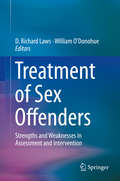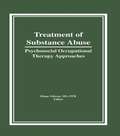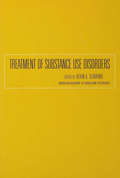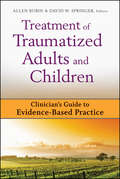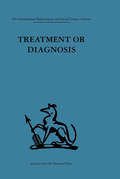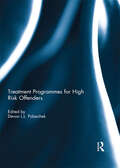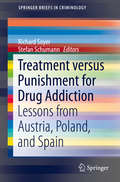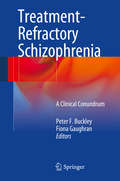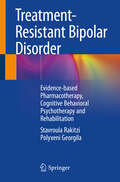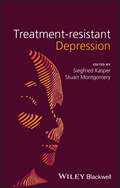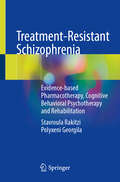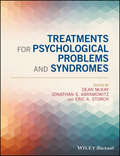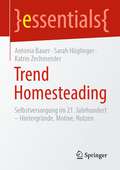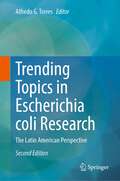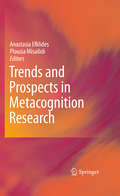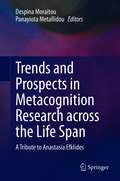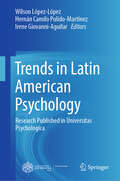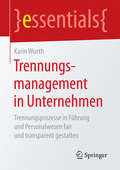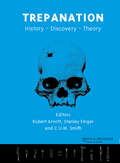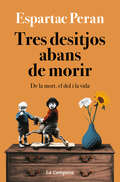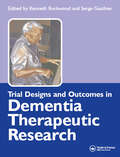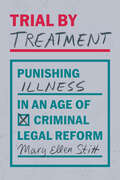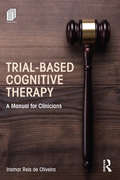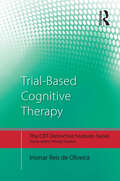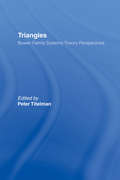- Table View
- List View
Treatment of Sex Offenders
by D. Richard Laws William O'DonohueThis rigorous survey offers a comprehensive rethinking of the assessment and treatment of sexual offenders for a bold challenge to practitioners. It critiques what we understand about offenders and the mechanisms of offending behaviors, and examines how this knowledge can best be used to reduce offending and relapses. To this end, experts weigh the efficacy of common assessment methods and interventions, the value of prevention programs, and the validity of the DSM's classifications of paraphilias. This strengths/weaknesses approach gives professional readers a guide to the current state as well as the future of research, practice, and policy affecting this complex and controversial field. Included in the coverage: Strengths of actuarial risk assessment. Risk formulation: the new frontier in risk assessment and management. Dynamic risk factors and offender rehabilitation: a comparison of the Good Lives Model and the Risk-Need-Responsivity Model. The best intentions: flaws in sexually violent predator laws. Desistance from crime: toward an integrated conceptualization for intervention. From a victim/offender duality to a public health perspective. A call to clear thought and accurate action, Treatment of Sex Offenders will generate discussion and interest among forensic psychologists, psychiatrists, clinical psychologists, and social workers.
Treatment of Substance Abuse: Psychosocial Occupational Therapy Approaches
by Diane GibsonThis timely volume fills a long-standing gap in the professional literature by providing an overview of contemporary assessment and rehabilitation of alcohol and chemical dependent substance abusers. Although many occupational therapists and other activity therapy staff work in substance abuse programs, few articles in occupational therapy literature address this relevant topic. Treatment of Substance Abuse: Psychosocial Occupational Therapy Approaches provides a unique overview of contemporary assessment and rehabilitiation of alcohol and chemical dependent substance abusers. The highlights of this insightful book include behavioral and educational frames of reference as well as specific treatment modalities such as stress management, activities of daily living, and leisure counseling. Contributors examine current polemics regarding programs that use methadone versus abstinence and theoretical concepts including the psychodynamic model with emphasis on the defensive structure underlying the abuser’s personality, as well as leveled conceptual framework for considering treatment. A number of practical techniques are discussed within the overall context of each article; hence the reader will find usable guidelines for establishing boundaries of treatment as well as discreet ideas about methods and practice. Roles and functions of varying disciplines are reviewed in an effort to discriminate role clarity and provide implications for practice in relation to different models. This issue is valuable to the OT who seeks an understanding of the varying viewpoints and current practice in the substance abuse field.
Treatment of Substance Use Disorders (Key Readings in Addiction Psychiatry)
by Kevin A. SevarinoFirst published in 2002. Routledge is an imprint of Taylor & Francis, an informa company.
Treatment of Traumatized Adults and Children
by Allen Rubin David W. SpringerPart of the Clinician's Guide to Evidence-Based Practice Series, Treatment of Traumatized Adults and Children provides busy mental health practitioners with detailed, step-by-step guidance for implementing clinical interventions that are supported by the latest scientific evidence. Edited by renowned educators Allen Rubin and David W. Springer, this thoroughly useful reference draws on a roster of experts and researchers in the field who have assembled state-of-the-art knowledge into this well-rounded guide, and covers the following interventions that have the best empirical support for treating posttraumatic stress disorder: Prolonged exposure therapy. Trauma-focused cognitive behavior therapy. Eye Movement Desensitization and Reprocessing (EMDR) Easy-to-use and accessible in tone, this indispensable resource is for practitioners who would like to implement evidence-based, compassionate, and effective interventions in their care of traumatized clients. Also in the Clinician's Guide to Evidence-Based Practice Series, Substance Abuse Treatment for Youth and Adults
Treatment or Diagnosis: A study of repeat prescriptions in general practice (Social Science Paperback Ser. #Vol. 253)
by John Hunt Marshall Marinker Michael Balint Dick Joyce Jasper WoodcockTavistock Press was established as a co-operative venture between the Tavistock Institute and Routledge & Kegan Paul (RKP) in the 1950s to produce a series of major contributions across the social sciences. This volume is part of a 2001 reissue of a selection of those important works which have since gone out of print, or are difficult to locate. Published by Routledge, 112 volumes in total are being brought together under the name The International Behavioural and Social Sciences Library: Classics from the Tavistock Press. Reproduced here in facsimile, this volume was originally published in 1970 and is available individually. The collection is also available in a number of themed mini-sets of between 5 and 13 volumes, or as a complete collection.
Treatment programmes for high risk offenders
by Devon L.L. PolaschekHigh risk offenders can have a disproportionate impact on their communities because, despite all manner of sentencing options, they continue to commit a wide range of crimes, both minor and serious. It is tempting to throw the book at them, sometimes even to throw away the key. However, anything that helps offenders to change their propensity for re-offending can really make a difference. Over the last 30 years, scientific research has guided the provision of treatment, rehabilitation and reintegration services that lead to reductions in re-offending. Much of what we know, however, comes from work with medium-risk offenders. Although this work is important and valuable, there is a lower level of complexity to working with medium-risk offenders than most high-risk offenders require. This book recognizes the need to research and develop different approaches to rehabilitating high-risk offenders. Each of the contributions takes a different approach, with a different group of offenders, in a different setting. Cumulatively, the chapters provide encouragement for those working with high risk offenders, along with a wide range of ideas about how to develop better services.This book was originally published as a special issue of Psychology, Crime & Law.
Treatment versus Punishment for Drug Addiction
by Richard Soyer Stefan SchumannThis brief summarizes the results of a two-year, international research project covering drug addiction treatment versus punishment in Austria, Poland, and Spain. It features: -An analysis of the national drug-related legislation and its application in these countries - An evaluation of drug laws and policies by both the law enforcement and drug treatment practitioners -An evaluation of drug-addicted offenders undergoing drug treatment versus punishment and their outcomes The basic findings of the project can be summarized as follows: drug addiction and drug-related criminal behavior should be treated as a psychiatric disorder and a chronic disease. The study supports the application of a treatment-oriented approach to drug-related delinquency. As this brief demonstrates, one challenge to an adequate treatment of drug addicted offenders is a lack of cooperation between the judicial and the medical sector, and an inconsistent application of policies. By comparing the legislation and application of drug laws in these three European countries, the authors provide insights with implications for other national legal systems. This brief will be of interest to researchers and policy-makers working with drug involved individuals, from criminology and criminal justice, public health, public policy and international comparative law.
Treatment-Refractory Schizophrenia
by Peter F. Buckley Fiona GaughranSchizophrenia is often associated with an inadequate response to pharmacological and non-pharmacological treatments. How to treat patients who have an unsatisfactory response to anti-psychotics, including clozapine - which is unequivocally the most powerful antipsychotic medication for this recalcitrant population - remains a clinical conundrum. A range of adjunctive medications have been tried with mixed results; there has also been renewed interest in the role of neuromodulatory strategies, electroconvulsive therapy, and cognitive and vocational approaches. Perhaps a bright spot for the future lies in the evolution of pharmacogenetic approaches for individualized care. In this book, leading experts from Europe, Australia and the Americas provide a timely appraisal of treatments for the most severely ill schizophrenia patients. This clinically focused book is informed by the latest research on the neurobiology and treatment of schizophrenia. It is comprehensive in scope, covering current treatment options, various add-on approaches, and a range of psychosocial treatments. The contributors are respected experts who have combined their clinical experience with cutting-edge research to provide readers with authoritative information on fundamental aspects of clinical care for schizophrenia.
Treatment-Resistant Bipolar Disorder: Evidence-based Pharmacotherapy, Cognitive Behavioral Psychotherapy and Rehabilitation
by Stavroula Rakitzi Polyxeni GeorgilaTreatment resistant Bipolar Disorder is one of the most chronic mental health disorders, which are associated with high suicidality, poor adherence to therapy high percentage of hospitalizations and poor quality of life. Effective recovery-oriented treatments are necessary in order to avoid the above dangers. These therapies contribute to a new reintegration into society. They also help people to accept themselves and to fight against stigma. A new beginning is possible. This book introduces an integrative therapeutic model, which focuses on the combination of recovery-oriented pharmacotherapy and psychotherapy. Additionally, strategies of building a better therapeutic relationship are presented and discussed. This book is of interest for psychiatrists, psychology students, clinical psychologists and cognitive behavioral psychotherapists
Treatment-Resistant Depression
by Siegfried Kasper Stuart A. MontgomeryThe first book devoted to a challenging disorder that affects millions of people around the world. Essential reading for all psychiatrists who manage these patients.
Treatment-Resistant Schizophrenia: Evidence-based Pharmacotherapy, Cognitive Behavioral Psychotherapy and Rehabilitation
by Stavroula Rakitzi Polyxeni GeorgilaTreatment-resistant schizophrenia is one of the most challenging mental health disorders and is associated with a high risk of relapse, repeated hospitalizations, suicidal behavior and poor quality of life. This book focuses on treatment-resistant schizophrenia, its clinical features, and evidence-based treatments: pharmacotherapy, cognitive-behavioral psychotherapy, and rehabilitation. A novel therapy targeting long-term recovery for treatment-resistant schizophrenia is discussed. The cognitive, metacognitive, and recovery perspectives represent the main elements. Each chapter begins with an abstract, followed by learning objectives, introduction, main text, discussion, conclusion, review questions, and bibliography. This structure, including learning objectives and review questions, reinforces the reader's learning process. It can also help improve the teaching process in seminars and courses.
Treatments for Psychological Problems and Syndromes
by Eric A. Storch Jonathan S. Abramowitz Dean McKayAn important new guide to flexible empirically supported practice in CBT. There is a growing movement across health care to adopt empirically supported practice. Treatments for Psychological Problems and Syndromes makes an important contribution by offering a comprehensive guide for adopting a more flexible approach to cognitive behavioural therapy. Edited by three recognized experts in the field of CBT, the text has three key aims: firstly to identify components of models describing specific psychological conditions that are empirically supported, poorly supported or unsupported; secondly to propose theoretical rationales for sequencing of interventions, and criteria for moving from one treatment procedure to the next; and thirdly to identify mechanisms of psychological syndromes that may interfere with established protocols in order to promote more informed treatment and improve outcomes. Written in clear and concise terms, this is an authoritative guide that will be relevant and useful to a wide range of readers from beginning clinicians to experienced practitioners.
Trend Homesteading: Selbstversorgung im 21. Jahrhundert – Hintergründe, Motive, Nutzen (essentials)
by Antonia Bauer Sarah Höglinger Katrin ZechmeisterHomesteading ist ein Trend aus den Vereinigten Staaten, bei dem die Selbstversorgung mit Nahrungsmitteln im Vordergrund steht. Für die Erhaltung der Gesundheit sind Lebensmittel ein wesentlicher Einflussfaktor, wobei deren Qualität eine wichtige Rolle spielt. Darüber hinaus zeigt sich, dass die Wertschätzung gegenüber Lebensmitteln in den letzten Jahren gesunken ist. Dieser Verlust der Wertschätzung führte allerdings zu einer Trendwende im Konsumverhalten in Bezug auf Herkunft, Anbauarten und Saisonalität. Dieses Buch zeigt, dass die COVID-19-Pandemie mit ein Beweggrund war, der viele Menschen zum Umdenken angeregt und die Motivation hervorgerufen hat, Lebensmittel verstärkt selbst anzubauen, zu konservieren und zu verarbeiten.
Trending Topics in Escherichia coli Research: The Latin American Perspective
by Alfredo G. TorresThe Latin American region has been at the forefront in combating infections caused by Escherichia coli strains in humans, animals, and the environment. The continuous emergence and evolution of pathogenic E. coli strains associated with human and animal infections have demonstrated that (i) groups of related pathogenic E. coli are responsible for most infections caused by this bacterial species; (ii) diverse virulence phenotypes expressed during infection defined each one of these pathogroups; (iii) the geographical distribution of pathogroups in Latin America and the evolution of new isolates was defined by the dominant pathogroup and presence of distinct virulence strains; (iv) acquisition of mobile elements or accumulation of point mutations accelerate the development of antibiotic resistance in some of these strains. The Latin American Coalition for Escherichia coli Research (LACER), a multidisciplinary network of over seventy research groups in eleven Latin American countries and the USA, was established in 2009 to apply One Health principles in defining and combating this pathogen. The previous edition of this text, Escherichia coli in the Americas (c. 2016) was the culmination of their wisdom about E. coli, from its role as a commensal bacterium to its characteristics as a pathogen causing disease in animals and humans. This new edition presents recent advances and contextualizes all aspects of E. coli in a One Health perspective, from the environment, to animals, to humans. It addresses E. coli interactions with host microbiota, CNS, and phages. It includes cutting edge insights on hybrid strains, molecular mechanisms of virulence and pathogenesis, resistance, domestic and wild reservoirs, disease surveillance in Latin America, genomic analysis, food safety, and new therapies. Crucially, it also provides translations and analysis of key reports on Escherichia coli published in Spanish and Portuguese. This book serves as a critical resource for scientists in industry and academia, clinicians managing associated infections, and trainees and students studying basic and clinical aspects of E. coli pathogenesis.
Trends and Prospects in Metacognition Research
by Plousia Misailidi Anastasia EfklidesTrends and Prospects in Metacognition presents a collection of chapters dealing principally with independent areas of empirical Metacogition research. These research foci, such as animal metacognition, neuropsychology of metacognition, implicit learning, metacognitive experiences, metamemory, young children's Metacogition, theory of mind, metacognitive knowledge, decision making, and interventions for the enhancement of metacognition, have all emerged as trends in the field of metacognition. Yet, the resulting research has not converged, precluding an integration of concepts and findings. Presenting a new theoretical framework, Trends and Prospects in Metacognition extends the classical definitions offered by Flavell and Nelson to carry the prospect of more integrated work into the future. By opening the possibility to cross the boundaries posed by traditionally independent research areas, this volume provides a foundation for the integration of research paradigms and concepts and builds on the relationship between metacognition and consciousness, while integrating basic with applied research.
Trends and Prospects in Metacognition Research across the Life Span: A Tribute to Anastasia Efklides
by Despina Moraitou Panayiota MetallidouThis volume brings together trends and their prospects to understand the complexity of metacognitive phenomena, with emphasis on the interactions of metacognition with affect. It discusses the three perspectives in understanding these interactions: the possible mechanisms underlying them, the manifestation of interactions of metacognition with affect in self- and co-regulation in social and educational contexts, and changes during development in young children and older adults. This volume is a tribute to Professor Emerita Anastasia Efklides, who was among the pioneers to investigate and argue the importance of the interactions between metacognition and affect. It serves as a dedication to her contribution in the widening of the scope of research in metacognition and self-regulated learning.
Trends in Latin American Psychology: Research Published in Universitas Psychologica
by Wilson López-López Hernán Camilo Pulido-Martínez Irene Giovanni-AguilarThis book brings together English versions of a selection of articles originally published in Spanish in Universitas Psychologica, one of the most important psychology journals in Latin America. It&’s an anthology of theoretical and research papers published by important Latin American psychologists that aim to provide the international community with a representative sample of research trends in Latin American psychology in different subfields. This anthology is organized in three parts, each one containing a selection of articles from different subfields of psychological research and practice. The first part brings together papers in the fields of social and community psychology, two areas in which Latin American psychologists have developed quite original contributions to research and practice. The second part is dedicated to articles showcasing research conducted with Latin American children and youth in the fields of educational, cognitive and developmental psychology. Finally, the third part highlights articles that present contributions of research in fields such as neuropsychology, clinical and health psychology to the improvement of mental and physical health care of the Latin American population. Each part starts with an introduction especially written by the volume editors for this anthology. Trends in Latin American Psychology: Research Published in Universitas Psychologica will be of interest to researchers in many subfields of psychology, especially to those interested in international and cross-cultural psychology, as the book offers a significative sample of the best research done by Latin American psychologists. The translation of the original articles in Spanish into English was done with the help of artificial intelligence. A subsequent human revision was done primarily in terms of content.
Trennungsmanagement in Unternehmen: Trennungsprozesse in Führung und Personalwesen fair und transparent gestalten (essentials)
by Karin WurthKarin Wurth wendet sich in diesem essential an F#65533;hrungskr#65533;fte und Personalverantwortliche, die aktiv in Trennungsprozesse in Unternehmen eingebunden sind und den Umgang damit als Teil einer guten Unternehmensf#65533;hrung begreifen. Die Autorin zeigt, dass sich ein wertsch#65533;tzender, transparenter Umgang mit den beteiligten Anspruchsgruppen in Trennungsprozessen lohnt. Ein professioneller Trennungsprozess mit dem eigentlichen Trennungsgespr#65533;ch im Zentrum bildet die praktische Basis aller Ma#65533;nahmen, deren Steuerung als Trennungsmanagement bezeichnet wird. Sie erl#65533;utert, wie die Unternehmenskultur durch faires Verhalten in schwierigen Situationen gest#65533;rkt wird.
Trepanation (Studies on Neuropsychology, Development, and Cognition)
by Stanley Finger Robert Arnott C.U.M. SmithThis volume will look at the history of trepanation, the identification of skulls, the tools used to make the cranial openings, and theories as to why trepanation might have been performed many thousands of years ago.
Tres desitjos abans de morir: De la mort, el dol i la vida
by Espartac Peran«La mare ens havia demanat tres coses abans de morir. No en vam poder complir cap». Converses, viatges, molta vida i amor per curar aquelles ferides que la mort dels nostres estimats ens deixa a la pell. «A casa, la mort i el dol van seure amb tots a taula. Vaig créixer al costat d’uns pares marcats per la mort del seu primer fi ll. Era el meu germà gran. No el vaig poder conèixer, no vam coincidir en el temps, però és com si el conegués de tota la vida. La mort ens ha ocupat molts moments i pensaments. No esquivar-la ens ha fet aferrar amb força a la vida.». Espartac Peran i Masafrets (Mataró, 1972) És periodista i presentador de Televisió de Catalunya.Part de la infància i joventut la va viure al mercat de la plaça de Cuba de Mataró, entre xivarri, parades, bona gent, olors i viandes que alimentaven el pap i l’ànima. Al mercat, la família hi tenia la parada de peix on ell també va despatxar uns quants anys. D’aquell ambient de basar, tan viu i acolorit, n’ha heretat, com a poc, l’estima per la paraula i la passió per la comunicació. I entre boga i surell, els seus inicis des de ben jove en el món de la comunicació van ser en mitjans locals com ara Televisió de Mataró, Ràdio Argentona i Ràdio Arenys. A partir d’aquí va fer el salt a mitjans com Cadena 13, Catalunya Cultura, Catalunya Ràdio i Rac 1. I a l’horitzó, el desig de treballar a TV3.S’hi va estrenar a l’edició del TN vespre i el TN migdia. Més endavant va presentar el TN nit i les notícies al canal 3/24. També va presentar el Trànsit, el programa Els matins i el concurs Bocamoll.Durant vuit anys va estar al capdavant del magazín diari de tardes Divendres, cada setmana i en directe des d’una població diferent del país. Actualment forma part de la direcció del concurs Atrapa’m si pots, i el camí continua.
Trial Designs and Outcomes in Dementia Therapeutic Research
by Serge Gauthier Kenneth RockwoodGiven the increased attention of clinicians, researchers, and the pharmaceutical industry to the management and treatment of dementia not only in the elderly but also in increasingly younger populations, the demands for effective evidence-based pharmaceutical control of dementia and quantitative assessment of outcomes have increased. From the first steps in the early 1960s to the controversial landmark paper of Summers and colleagues to the most recent trials, it is clear both that much progress has been made and that much remains to be done. This book is written to take stock of what is now usefully known and to speculate on directions for the future.
Trial by Treatment: Punishing Illness in an Age of Criminal Legal Reform
by Mary Ellen StittA troubling account of the unexpected impacts of treatment-based alternatives to criminal punishment. Every year, courts send hundreds of thousands of people to treatment-based programs as alternatives to traditional punishment. These alternatives—known as ‘diversion programs’—are widely celebrated as reforms that reduce the punishment of the mentally ill. But in Trial by Treatment, Mary Ellen Stitt shows that they have, in fact, expanded the reach of the criminal legal system and its power over the lives of the most vulnerable. The inner workings of diversion programs are obscure, partially by design, and data on outcomes is hard to come by. Stitt draws on two years of fieldwork in criminal courtrooms and court-mandated treatment sessions, as well as an original national dataset, in-depth interviews, and experimental survey data, to document the hidden impacts of diversion. She shows that placing mental healthcare under the control of the courts has helped to legitimize the criminalization of illness, warped treatment environments, and amplified inequalities in punishment. In vivid and humanizing detail, Trial by Treatment shows how reforms that keep power and discretion in the same hands can entrench the very problems they promised to solve.
Trial-Based Cognitive Therapy: A Manual for Clinicians (Clinical Topics in Psychology and Psychiatry)
by Irismar Reis de OliveiraTrial-Based Cognitive Therapy presents a model that, although still inherently Beckian, organizes known cognitive and behavioral techniques in a step-by-step fashion in order to make cognitive therapy easier for the new therapist to learn, easier for patients to understand, and simpler to implement. Based on and backed up by a series of published studies, Trial-Based Cognitive Therapy lays out structured strategies for changing core beliefs about the self, and its clear, coherent, integrative conceptualization of psychopathology is presented as an easy-to-remember case-formulation model that is useful for both the therapist and the client. This book introduces a new approach, the Trial-Based Cognitive Therapy (TBCT), whose main technique, the Trial-Based Thought Record (TBTR), is a structured strategy to change core beliefs about the self and is presented as a law-centered analogy in which the therapist engages the client in a simulation of the judicial process. Perfect for psychotherapists at any level, Trial-Based Cognitive Therapy presents a balanced blend of theory advancement, scientific scrutiny of a new method, and practical application.
Trial-Based Cognitive Therapy: Distinctive features (CBT Distinctive Features)
by Irismar Reis de OliveiraTrial-Based Cognitive Therapy (TBCT) is a new model of cognitive behaviour therapy (CBT) that organizes standard cognitive and behavioural techniques in a step-by-step fashion, making CBT more easily mastered by the new therapist, more easily understood by the patients, and simpler to be implemented, whilst still maintaining flexibility and CBT’s recognized effectiveness. Dividing thirty key features into two parts: ‘Theory and Practice’, this concise book explores the principles of TBCT, explains the techniques developed throughout TBCT therapy to change dysfunctional cognitions, and provides a clear guide to the distinctive characteristics of TBCT. Trial-Based Cognitive Therapy will be of interest to psychiatrists, psychologists, social workers, therapists, counsellors and other professionals working in the field of mental health, plus those wanting to learn CBT. Trial-Based Cognitive Therapy is part of the Distinctive Features series, which asks leading practitioners and theorists of the main CBT therapies to highlight the main features of their particular developing approach. The series as a whole will be essential reading for psychotherapists, counsellors and psychologists of all orientations.
Triangles: Bowen Family Systems Theory Perspectives
by Peter TitelmanMove through emotional triangles toward a natural systems view of the individual in the context of the family and society Triangles: Bowen Family Systems Theory Perspectives presents clear applications of Murray Bowen&’s concept of the emotional triangle in the family, the organization, and society. This comprehensive book discusses in detail the theory, the theory&’s application to the therapist&’s own family, clinical applications, organizational applications, and societal applications. This unique resource examines the value of the triangle concept for understanding the emotional process of the family, the organization, and society. Triangles: Bowen Family Systems Theory Perspectives provides a theoretical context for understanding the triangle concept and its application, then progresses to exploring and applying the concept of the triangle and interlocking triangles to self, family, and other contexts. This book is devoted to explicating Bowen&’s seminal concept of the triangle, and providing a clear description of the process of detriangling in clinical practice. The text includes several case studies and vignettes to illustrate concepts. Topics in Triangles: Bowen Family Systems Theory Perspectives include: a historical and conceptual overview the triangle&’s function in the effort to increase differentiation of self the presence of triangles in non-human primates Bowen&’s differentiation of self effort in his own family and business the functioning of triangles at the time of chronic illness and death emotional triangles involving pets and humans the application of the concept of triangles and interlocking triangles to clinical issues in marriage the presence of triangles in the child-focused family triangles in stepfamilies the triangle&’s presence and function in families with substance abusing teens triangles involving extramarital relationships triangles in organizations and businesses the triangle&’s function in the context in societal emotional process and much more! Triangles: Bowen Family Systems Theory Perspectives is a stimulating, enlightening resource for family therapists, social workers, psychologists, pastoral counselors, and counselors.
